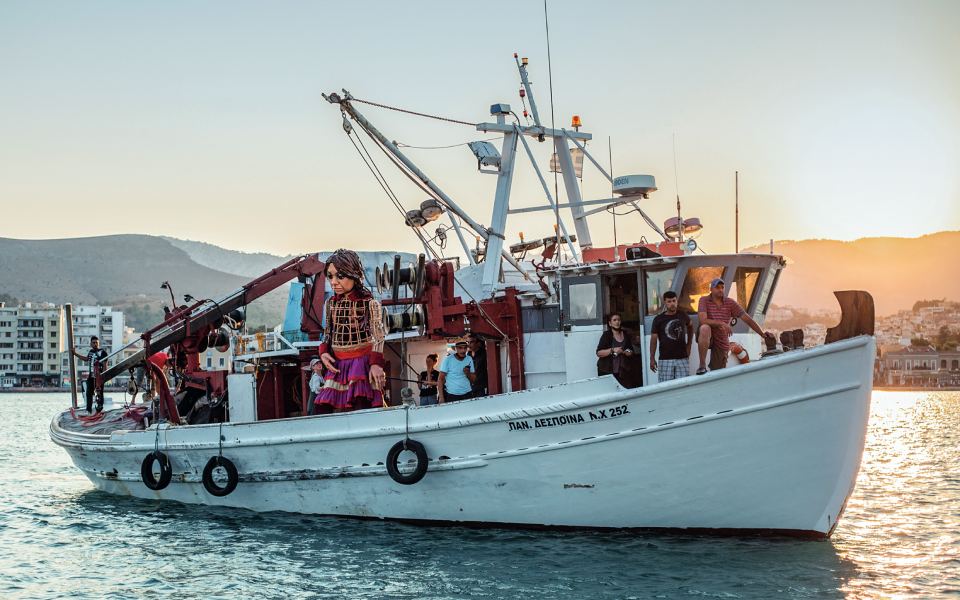“I see her, mum! There she is, there she is! Hello Amal!” exclaim the children at the port of Chios, standing on their tiptoes and trying to get a glance of the nine-year-old girl they’re welcoming. Standing next to me, the producer and director of this event, Yolanda Markopoulou, anxiously awaits the little refugee girl, too. “We made a show whose lead actress appears at the premiere,” she says.
Anxiety is to be expected. No one present – organizers, spectators or guests of honor – knows with certainty what’s about to happen, or whether things will go to plan. The boat that’s carrying Amal approaches the waterfront, and the crowd looks at the little girl. They can’t help looking at her, in fact. She is 3.5 meters tall, and she is a puppet. She steps foot on the dock. Those holding their breath exhale. It has begun.
Based on the character of the same name from Joe Robertson’s and Joe Murphy’s very successful play The Jungle – first performed in the Calais migrant camp in France and then on the stage of the Young Vic Theater in London, and later in New York and San Francisco – this gigantic little girl is a nine-year-old child refugee who’s travelling from Gaziantep, on the border between Turkey and Syria, through Europe to Manchester, England, to find her mother, start school again, and begin a new life. In this role, she embodies and represents all those unaccompanied children who are making the same dangerous and lonesome journey across Europe.
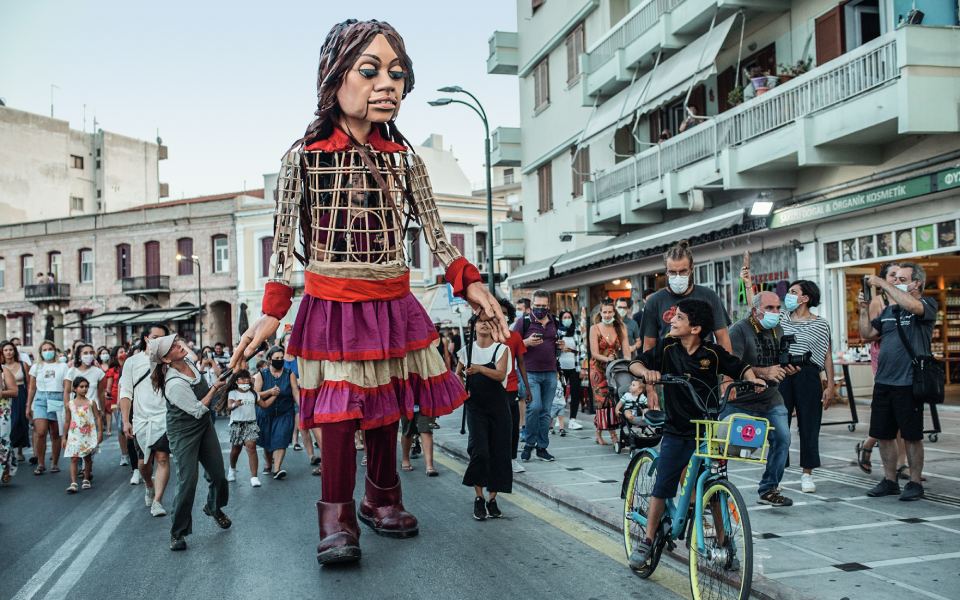
Tiny cracks in an enormous dam
The project known as The Walk: Amal’s Journey came to into being after one of many conversations between theatre legends David Lan and Stephen Daldry. Lan, artistic director of the Young Vic Theatre for 18 consecutive years and producer of The Jungle, is also one of the producers of The Walk, as is Daldry, multi-award-winning director of The Crown, The Hours, and Billy Elliot, as well as The Jungle, along with Naomi Webb and Tracey Seaward.
When asked what made him feel like he wanted to create something beyond the theatre play, Lan replies: “It’s hard to say, but at a certain point, I felt that I, David, needed it, wanted it – I don’t know. I suppose I wanted to make use of the experience I had listening to people who are refugees and had made the journey. I just had the idea to walk. It’s a very simple thing.”
While in conversation with Daldry, they agreed that the journey had to include theatre and performance. “That [theatre] is what I know something about, I suppose. It started with a very small conversation born of a feeling of ‘What is the thing that we can do?’ If I were a shoemaker, then the right thing to do would be to make shoes, and the refugees would be more grateful for the shoes than they would be for us doing The Walk, but I can’t make shoes,” he says, laughing.
Describing himself earlier, he said “I don’t know what the hell I am. I’m an artist, I’m a writer. I hesitate to say artist, but I make things of different kinds.” They are, however, things that he doesn’t want to oversell. “I’m always careful when trying to describe what we’re doing; I don’t want to say we’re doing a big thing, or a good thing, or an important thing. You help, of course, by trying to generate good feelings, good will, a positive response to people in trouble. That’s a good thing in the world. But we don’t think we’re saving the planet.”
Perhaps Amal and her journey can’t save the planet. Perhaps it can only bring together certain communities. It’s possible we’re just talking about tiny cracks in an enormous dam. Maybe that’s the best we can hope for. In any case, Amal, standing 3.5 meters tall, forces you to see her, she reminds you that, in a world that’s swept by a pandemic, by disastrous wildfires or whatever else, there’s still a refugee crisis and people are still trapped in it.
Things are quite simple. The meaning of this endeavor can be boiled down to one question: How would you welcome an unaccompanied nine-year-old girl to your town?
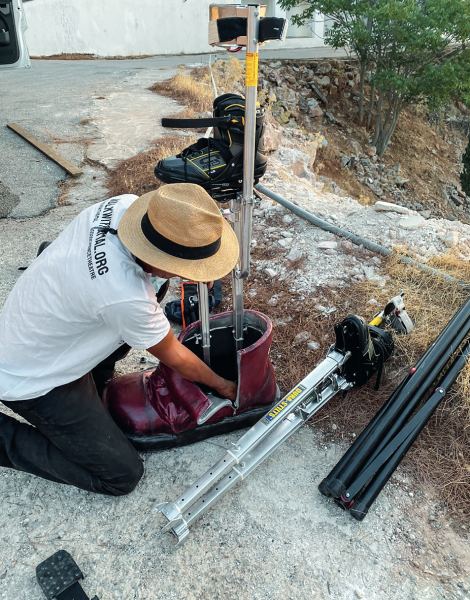
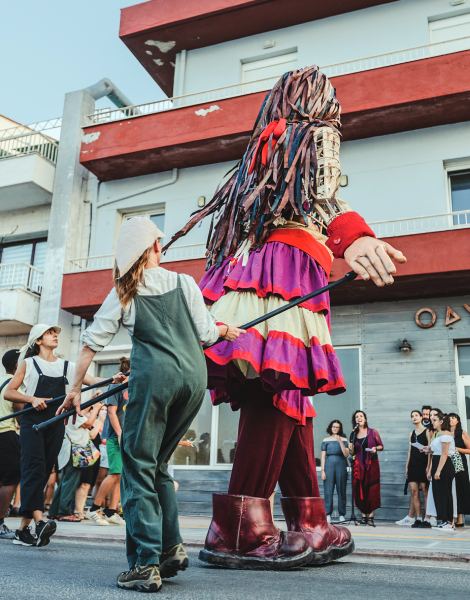
Instinctive affection
That’s the question for every single one of the eight countries – Turkey, Greece, Italy, Switzerland, France, Germany, Belgium and United Kingdom – that will be welcoming Amal during her long journey.
Kevin Fitzmaurice, executive producer of the project, says that the reaction of every community is instinctively affectionate. “People immediately feel a sense of protectiveness for Amal,” he says, looking pensive.
That same affection is felt by the people from Good Chance Theatre and Handspring Puppet Company who made her and are accompanying her on her journey. “That little girl has become a real presence for us. We all refer to her by name. She is not just a puppet,” Fitzmaurice adds. Indeed, in a toast honoring Basil Jones and Adrian Kohler, Amal’s creators, the artistic director of The Walk, Amir Nizar Zuabi, told them: “You’ve been excellent fathers to Amal. We hope we can be equally good uncles to her.”
After all, it takes four puppeteers to bring little Amal to life: one on each arm, one supporting her back and one inside walking on stilts. She is definitely not just a puppet to them.
Kevin Fitzmaurice shows me two pictures he took at the events in Turkey. One of them is of a family sitting οn their doorstep as Amal approaches. The mother and the children are smiling, even though they’re looking at Amal warily. The father is looking at her with outright distrust. In the next picture, taken only seconds after the first one, Amal is walking past them and they are interacting with her. Everyone’s smiling. That’s Amal’s effect. That’s something we can hope for.
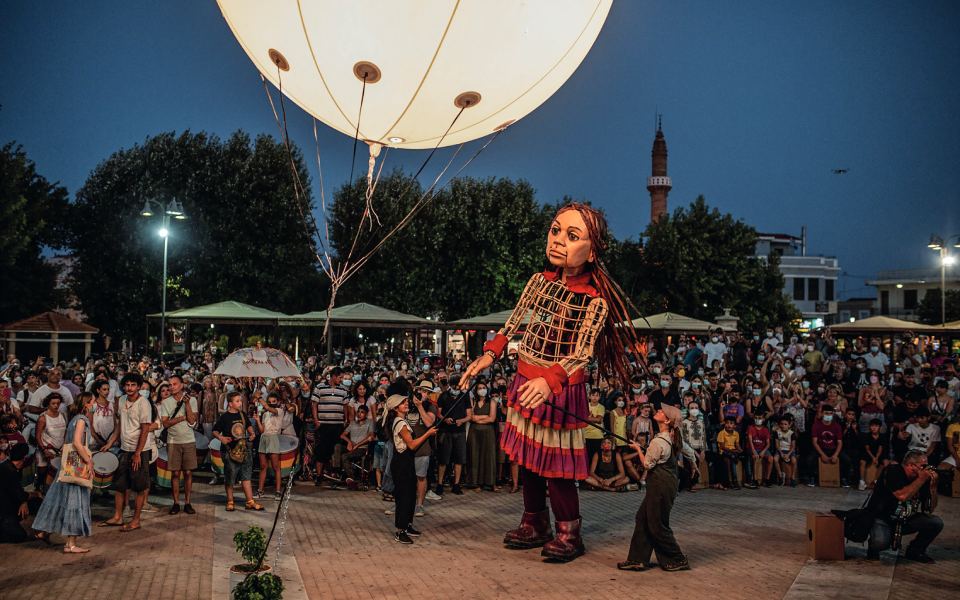
“Everything that matters, we share”
However, not everyone reacts that way. Just read the comments under one of the stories in the Greek media about welcoming Amal to our country, at her first stop in Chios, and you’ll very quickly understand that not everyone wants to welcome her. Some people not only don’t want to make an event of greeting her – they don’t want to greet her at all.
I talk about this with David Lan: “I hope I’m not naive about this. In my own country, the response to the needs of people in deep trouble hasn’t always been admirable. I know that the presence of people in need from other parts of the world can generate aggression, hostility, unhappiness, distress. Everybody’s welcome at The Walk. And it’s been very moving actually how many people have come, but a lot of people haven’t, and that’s also fine. It’s simply an offer. Do you want to welcome this child? If you don’t, that’s fine, but if you do, think about how you could do it in a way which is meaningful to you.”
The Walk goes far beyond just welcoming a child. Besides showcasing the internal conflict she suffers between trying to survive and trying to keep her humanity alive, the aim is to shine light on the refugees’ potential as well. “Refugees need food and blankets, but they also need dignity and a voice,” says Amir Nizar Zuabi. Very often, we attach the identity of a refugee to those people, and nothing else. As if they come here unshaped, without their own experiences, without their own abilities and aspirations. The conversation goes deeper. And universality might be the answer.
“Of course, if you travel from Southeast Turkey to Manchester, there are many things which are different,” Lan points out. “But honestly, the similarities are much, much greater, especially when we’re in situations of danger or of challenge. You know, if a bomb is falling on your house, your response in Syria or your response in Manchester is going to be more or less the same. The response to illness, the way people feel about their families or about their friends, the way people feel about disparities of wealth within a society, the way people feel about justice. Many things are different but many, many, many things are the same.”
“It’s a strange thing… that people feel that children are innocent but grown-ups aren’t,” Lan adds. “We think that if a child is in need, you help the child. If an adult is in need, you can be critical and think ‘That person shouldn’t have found themselves living on the street’ or that ‘It’s their fault in some way, so I don’t have to help them.’ But we all know that children are vulnerable, so we share. Everything that matters, we share.”
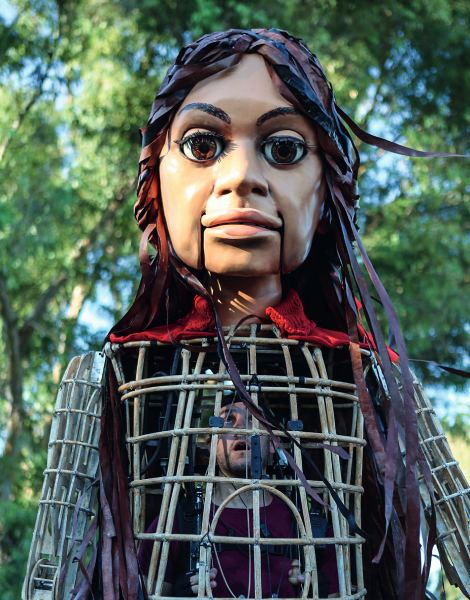
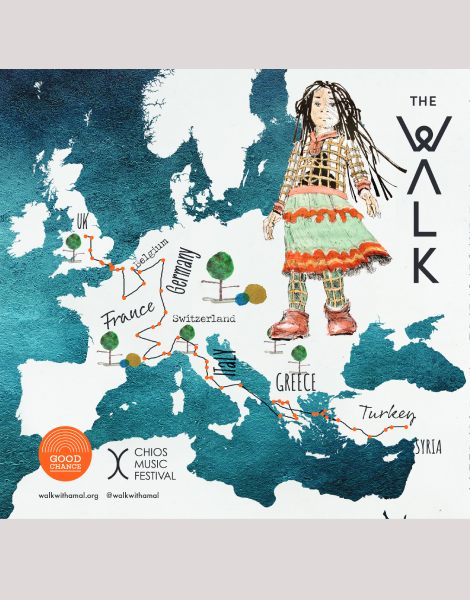
“Amal, I welcome you to fragrant Chios”
Still, even welcoming a child is not a simple thing. The obstacles this year were numerous and disproportionate: pandemic, wildfires and typical bureaucratic impediments. Nonetheless, the Greek production team managed to overcome all those hurdles. That Good Chance Theatre chose director Yolanda Markopoulou to be the producer of The Walk for Greece makes sense. Having explored the refugee crisis through art, amongst other things, for more than 10 years, and having created Station Athens, a theatre workshop for refugees, Markolopoulou was the right person for this project. What she wanted from the start was to bring the different communities of the island together – and she did just that.
Thus, welcoming little Amal was a collaborative effort involving many parties: the relatively new Chios Music Festival, under the guidance of its creators, composer Lefteris Veniadis and violin player Olga Holdorff-Myriangou, and, more specifically, of its educational music programme for refugee children taught by Andrianna Neamoniti; the Transit Accommodation Facilities for Unaccompanied Minors of the non-governmental organization METAdrasi; the UNHCR; the non-governmental organization Arsis; the Philharmonic of the Municipality of Chios under the baton of Eugenia Vorria; the Brasilionico Grupo Percussivo; the Chios Music School; the Hellenic Theatre/Drama Education Network; choirs from various associations; and many volunteers.
These people, from the small but miraculous team of the Greek production company Polyplanity Productions to the parents of the local children who tried to help every step of the way, all worked tirelessly for a year and a half, in spite of the circumstances, in order to organize a welcome for our little refugee girl. The crowd greeted Amal with new takes on the traditional Chios “painemata,” the island’s New Year’s carols with their familiar melody, from the port all the way to Vounakiou Square.
On every stop along the way, the voices of refugees and of local children joined that of renowned singer Katerina Papadopoulou in wishing Amal well after the trauma of being a refugee. They wished her luck in finding her family and in starting back to school, and the strength to make her dreams come true.
Everyone’s response – from the world-famous organizers to the islanders themselves – was enthusiastic. Watching Amal stare in wonder at the illuminated balloon that had been set up on Vounakiou Square, next to the tin containers that once held feta cheese but now act as flower pots for fragrant basil plants – an eternal image of Greek summer – and seeing the excitement on the faces of the families of the island, you could see, before your very eyes, one more little crack opening up in the dam, a crack through which light dared to shine. As it always will.

